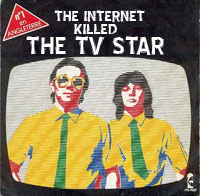
Yes, I realize this is only going to happen where real broadband is available. Saying that, it’s worth keeping in touch in case we accidentally get the opportunity here to get on board with 21st Century communications.
SONY, Matsushita and three other Japanese electronics makers plan to develop a joint standard for new Internet televisions that will make it easier for people to see video available on the Web, a Sony spokeswoman said yesterday.
The TVs aim to make accessing video and similar online content easier than with computers, spokeswoman Mina Naito said. The other companies involved are Sharp Corp, Toshiba Corp and Hitachi Ltd.
The companies plan to start selling the new televisions as early as next year.
The Internet TVs will features a remote control that allows online access with the touch of a button and will also eliminate the need for a personal computer keyboard to make the gadget more user-friendly, the Nihon Keizai said.
The new televisions will use Linux operating systems instead of Microsoft Windows.
Yes, I noticed that, too.















This kind of sounds like specialized webtv. Youtube at full screen – not too compelling.
Sounds like the VoIP phones out there. (you tell it a directory server or, in the case of VoIP offered by your cable or DSL company, just let a DHCP-like system do the job)
Either way, good to see them running Linux. I can confirm from personal experience that their argument for doing so is sound. (not to mention the benefit of not being chained to Microsoft by a restrictive license agreement in the best case, and close-source software in the worst)
Great – but who’s providing the programming to watch on these sets?
The US isnt ready for it. The Net isnt Big enough or powerful enough.
If they try it, it will COST you MORe then cable/Sat TV.
Still, it’s nice to have an option that we could reject.
You guys do realize that those TVs will be a huge hit for two reasons:
a) There are TV shows up there that are already highly interactive.
b) 40mbps internet access is as common as dialup is down here in Latinamerica.
The only reason this stuff won’t work is the speed.
Get those jerks in the telecos to stop messing around with the net neutrality issue and put those lobbying money where they should be: improving the internet environment. (especially internet SPEED)
It’s a pity that the Senators are so technophobic that they chose to ignore that their citizens are a couple of years behing many countries technologywise.
I don’t really care who does it, but there should be at least one company providing someing close to 50Mbps at a reasonable price to at least the metropolitan areas by 2008. If not, we will be seeing the downfall of the US.
Don’t forget there are markets outside of the US, many much farther along in their broadband efforts. To gauge success of this on how well our networks function is a limited view.
There are already high-end personal electronics that aren’t even released to the US market due to consumers’ general lack of technical saavy and providers’ support.
Are we watching the beginning of even more separation between the US and other electronics markets?
At what point will we be so behind in our infrastructure and acceptance that we become a secondary market?
I’m glad the Blame America First crowd has a thread all their own on this blog.
What is happening in these third world countires that uses all that bandwidth? It’s not IPTV, they don’t have it yet.
What infrastructre behind these technologies could support the broad user base that would adapt it in the US, and where else is it in place in the world today?
You guys are playing the chicken-n-egg scenario the wrong way. First the need for bandwidth happens, then the bandwidth is rolled out. It’s never played out the other way in any of these countries.